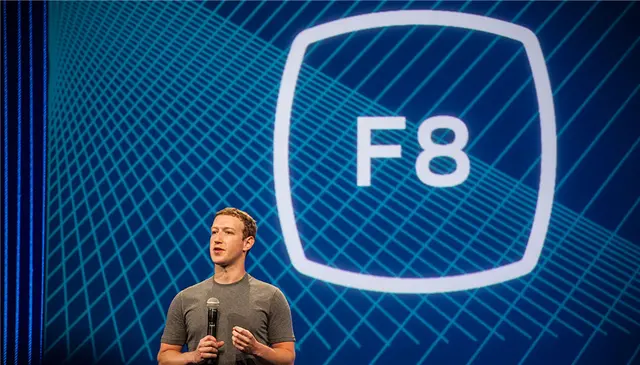(THE GUARDIAN) WhenMark Zuckerberglaunched Facebook in 2004, he pitched it as a way to get a date.
Opening his company’s annual F8 developer conference in San Francisco on Tuesday, Zuckerberg illustrated just how ambitious he’s become in 14 years. Facebook, he says, will now bring the world online, pioneerartificial intelligenceandperfect virtual reality(VR).
He introduced “bots” that would serve as robotic customer service reps for news, weather and retail companies, and showed how he wants to use virtual reality to put grandparents inside baby videos. He also brought on stage a carbon fiber tube fromFacebook’s Aquila pilotless planethat will beam wireless internet down to parts of the developing world.
“If you had told meFacebookwas going to build a plane I would have told you you were crazy,” he said. The plane, which he said “weighs less than a small car”, will fly at 60,000ft (twice the height of commercial airliners) and be able to stay airborne for several months at a time.
Zuckerberg’s ambitions illustrate how technology companies are no longer content with getting people to visit their website or download their app; their future depends on being omnipresent in people’s lives.
In a thinly veiled attack on US presidential hopeful Donald Trump, Zuckerberg said: “I’m starting to see people and nations turning inward against this idea of a connected world. I hear fearful voices talking about building walls … It takes courage to chose hope over fear.”
The Facebook CEO has spent the past three years lobbying for more visas for foreign workers.
“Instead of building walls we can help build bridges. Instead of dividing people we can connect people. We do it one person at a time, one connection at time. That’s why I think the work we’re doing together is more important than it has ever been before,” he said.
Much of the buzz was around a seemingly nerdy new product:chat bots. Bots are tools that send live, automated messages or images into Facebook’s chat tool Messenger, which is used by 900 million people every month and 50m businesses. For many users, it will be their first experience of interacting with an artificial intelligence.
Developers will be able to build new chat bots to work with Messenger. Zuckerberg demonstrated Facebook’s first bots including CNN, which will send articles to users with conversational teasers, and 1-800-Flowers which can order flower deliveries with personalized messages. Other bots will deliver weather and news updates, receipts and shipping notification.
For Facebook, the move is as much about making money as being social. If businesses use Facebook as a way to sell more, Facebook can make more money from them.
Speaking on stage, David Marcus, Facebook’s head of messaging and a former eBay executive, joked about how addictive it was to interact with businesses’ bots. “I guarantee you’re going to spend way more money than you want on this,” he said.
If bots are still foreign to normal people, they are the programming trend of the day here in Silicon Valley. After his speech, attendees struggled to fit inside a tent for a bots demo. “Is that us? Sweet!” he said as he marveled at the number of people trying to get in.
Customers have to opt in to engage with any company’s Messenger bot and, for now, companies aren’t supposed to use it for pure advertising.
Facebook’s other big push is more closely related to its original purpose for many consumers: as a place to post pictures. Except now, Zuckerberg says he imagines a future where consumers find ways to jump into their pictures. This year, the company started shipping its Oculus Rift virtual reality headsets and is working to develop “360-degree” cameras that capture all parts of a setting.
“You actually feel you’re right there with another person,” Zuckerberg said.
Gear VR, Facebook’s low-end virtual reality goggles, is part of a technology that Zuckerberg claimed is going to “change the way we all experience the world”. Customers have so far watched 2m hours of VR video, he said, and more than 50 games have been launched so far.
He also demonstrated an app that allowed two people to play together virtually, and said that in late 2016 Oculus, the Facebook-owned VR company, will launch a set of touch controllers which will allow users to touch and manipulate objects in virtual applications. “This will allow a whole new layer of immersion, a whole new set of social experiences across all these VR platforms … experiences you can’t have with any existing platform today.”
This will be paired with Facebook’s recent push into live video, which lets people broadcast whatever they’re doing from a smartphone.
“Just the other week, I saw a live video of a woman with her young kids skiing down the hill,” Zuckerberg said. “I really just want to make sure these kids get down this hill.”
Zuckerberg also showed a mock-up of a pair of augmented-reality glasses that looked more like a normal pair of dark-rimmed specs. Augmented reality allows images and data to be overlaid on our view of the real world, and will mean that a lot of physical objects could potentially be replaced by an augmented-reality app, he said.
“In the future if you want to pull out your photos and make it as big as you want, you could pull out your AR glasses and make it as big as you want and show it to people … objects like your TV could bereplaced by $1 apps in the AR app store.”
“But it will take a long time to make it work.”
 简体中文
简体中文

